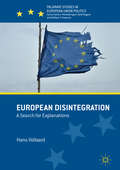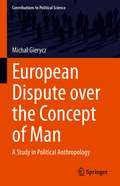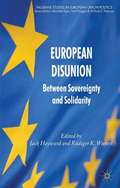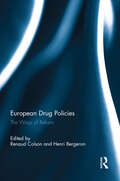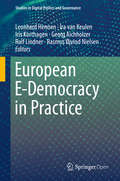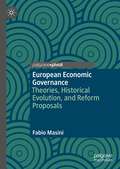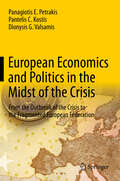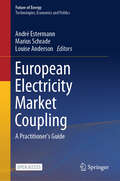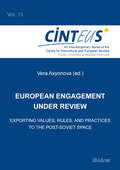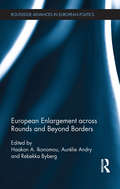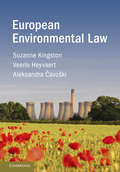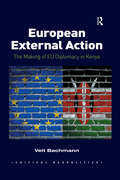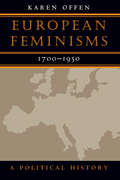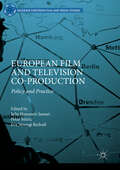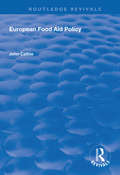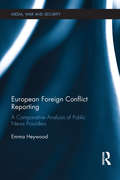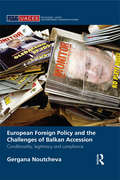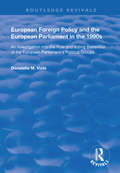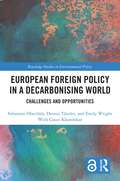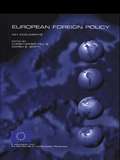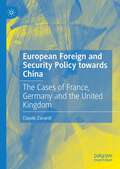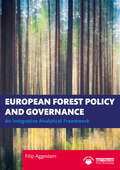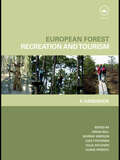- Table View
- List View
European Disintegration: A Search For Explanations (Palgrave Studies in European Union Politics)
by Hans VollaardThis book accounts for whether and how the path of the European Union (EU) has developed towards potential disintegration. These questions have become particularly relevant since the outbreak of the debt crises in the Eurozone and the Brexit referendum. The author critically subverts theories of European integration and analyses the rise and fall of federations, empires and states in a comparative perspective. The most promising theory presented here indicates that Brexit is not likely to be followed by other member states leaving the EU. Nevertheless, the EU has been undermined from within as it cannot adequately address Eurosceptic dissatisfaction from both the left and right. This book is an essential read for everyone interested in the EU and its future.
European Dispute over the Concept of Man: A Study in Political Anthropology (Contributions to Political Science)
by Michał GieryczThe book represents original research in a field of study rarely pursued while analysing the intellectual dimensions of disputes over ethically sensitive issues that occur in European Union politics. These disputes are generally analysed at ideological, ethical, economic and interstate levels. However, these references do not suffice in understanding the issue, which is related to a divergent perception of the essence of humanity and thus the subject matter of anthropology. The main research objective of the monograph is therefore to reconstruct the sources and the specific European Union way of thinking about the human being. Methodologically, the book expands the understanding of political anthropology within political science and presents a range of suitable instruments for pursuing anthropological research. At the theoretical level, it proposes an anthropological typology of the main currents of European political thought and reveals their prominence for the anthropological orientation of the EU's axiology. Empirically, it provides an analysis of the anthropological features of European Union institutions and policies in addition to discussing the relation between the axiological and anthropological positions of the main political and national groups within the EU.
European Disunio: Between Sovereignty and Solidarity (Palgrave Studies in European Union Politics)
by Jack Hayward Rüdiger WurzelThe Euro crisis catapulted the EU into its most serious political crisis since its inception, leaving it torn between opposing demands for more sovereignty and solidarity. This volume focuses on the key themes of disunion, sovereignty and solidarity. It assesses the main EU institutions: member states, civil society actors and policy areas.
European Drug Policies: The Ways of Reform
by Renaud Colson Henri BergeronThe drug control regime established by the international community has not succeeded in curbing either the demand for, or the offer of, narcotics. But, despite a series of developments in the Americas – including the legalisation of cannabis in Uruguay and in several states in the United States of America – there is still little support in Europe for repealing drug-prohibition laws. Nevertheless, a gradual policy convergence reveals the emergence of a European model favouring public-health strategies over a strictly penal approach to combatting drugs, while growing transnational support for legalisation indicates the persistence of an alternative paradigm for drug policy. This book examines the various influences on drug policies in Europe, as grassroots movements, NGO networks, private foundations and academic research centres increasingly confront the prevailing discourses of drug prohibition. Pursuing an interdisciplinary approach and bringing together legal scholars, social scientists and practitioners, it provides a comprehensive and critical assessment of drug policy reform in Europe.
European E-Democracy in Practice (Studies in Digital Politics and Governance)
by Ralf Lindner Georg Aichholzer Leonhard Hennen Ira Van Keulen Rasmus Øjvind Nielsen Iris KorthagenThis open access book explores how digital tools and social media technologies can contribute to better participation and involvement of EU citizens in European politics. By analyzing selected representative e-participation projects at the local, national and European governmental levels, it identifies the preconditions, best practices and shortcomings of e-participation practices in connection with EU decision-making procedures and institutions. The book features case studies on parliamentary monitoring, e-voting practices, and e-publics, and offers recommendations for improving the integration of e-democracy in European politics and governance. Accordingly, it will appeal to scholars as well as practitioners interested in identifying suitable e-participation tools for European institutions and thus helps to reduce the EU’s current democratic deficit. This book is a continuation of the book “Electronic Democracy in Europe” published by Springer.
European Economic Governance: Theories, Historical Evolution, and Reform Proposals
by Fabio MasiniThis book examines the economic theories and policies that underline the governance of the European Union. Through exploring the history of European economic governance and how this framework has evolved over time, it contextualises theoretical influences, policy debates surrounding the European Union and its instruments of governance, including the European Semester, Six Pack, Two Pack, and Fiscal Compact. Forthcoming reforms to fiscal rules and the economic policy architecture of the European Union are also discussed, with a particular focus on the impact of the COVID-19 pandemic. This book aims to give readers a broad understanding of the framework and dynamics that define European economic governance. It will be relevant to researchers and policymakers interested in the European political economy.
European Economics and Politics in the Midst of the Crisis
by Panagiotis E. Petrakis Pantelis C. Kostis Dionysis G. ValsamisThis book presents an overview of the economics and politics implemented in the European Union and especially the Eurozone during the crisis of 2008-2012. Although it focuses on these four years, the analysis starts from the establishment of the European Union and covers the period up to the outbreak of the Cypriot banking crisis in mid-2013. The long-term creation of structural changes in European economics and politics is associated with a growth lag within the global economic environment dynamics. The economic and political consequences of the crisis and the development of new institutions will shape the future growth dynamics towards a Fragmented European Federation.
European Electricity Market Coupling: A Practitioner’s Guide (Future of Energy)
by Louise Anderson André Estermann Marius SchradeThis open access book provides a comprehensive overview of the European Electricity Market Coupling. Tracing the evolution of the EU&’s efforts to create an Internal Energy Market, it explores the history, principles and roles of all key actors from Transmission System Operators (TSOs) to service providers to National Regulatory Authorities (NRAs) in Single Day-ahead and Intraday Coupling. Key topics include the framework of market coupling, the day-ahead and intraday algorithms, procedures, financial settlement, and the viewpoints from traders to interested countries to join the European Electricity Market Coupling in the future. An essential read for industry professionals and scholars alike, this book offers first-hand insights into the practical processes and fundamentals of electricity trading in Europe.
European Energy Security
by Mehmet Efe BiresseliogluAn exploration of Turkey's future role and impact on European energy security, looking at the connection between geopolitics, energy security and the EU's need for energy. The book focuses on Turkey's foreign and energy policies and importance as a natural funnel through which the EU can access hydrocarbons and renewables.
European Engagement Under Review: Exporting Values, Rules, and Practices to the Post-Soviet Space (An Interdisciplinary Series of the Centre for Intercultural and European Studies #15)
by Vera AxyonovaThis timely book seeks to contribute to the debate on the transfer of values, rules, and practices by European actors to former Soviet countries. The actors in focus include multilateral organizations, such as the European Union, the Council of Europe, and the Organization for Security and Cooperation in Europe, as well as European governments and non-governmental organizations. The contributions in this collection address different aspects of the export or transfer of values, such as democracy, human rights, and the rule of law, as well as rules and practices in the fields of education and migration management, examining the motives, mechanisms, and effects of European engagement.
European Enlargement across Rounds and Beyond Borders (Routledge Advances in European Politics)
by Haakon A. Ikonomou Aurélie Andry Rebekka BybergEnlargement has been an almost constant part of European integration history – going from an improvised exercise to the EU’s most developed foreign policy tool. However, neither the longevity nor the complexity of enlargement has been properly historicised. European Enlargement across Rounds and Beyond Borders offers three interdisciplinary, innovative, and indeed radical, new ways of understanding and analysing EC/EU enlargements: first, tracing Longue Durée developments; second, investigating enlargement Beyond the Road to Membership; and third, exploring the Entangled Exchanges and synergies between the EC/EU and its outside. This edited volume will provide fresh perspectives on enlargement as one of the defining processes in Europe in the second half of the 20th century: How are we to understand enlargement as a policy? How has it changed the EU? What is the historical role of the British press in shaping the UK’s visions of Europe? How has enlargement played into Russia’s relationship with today’s EU? Giving answers to these questions, and many more, this volume wishes to spark a broad debate about the roots, range, and repercussions of enlargement, and how historians, and other scholars, should engage with it. This publication will be of key interest to scholars and students of modern European history and politics, the European integration process, EU studies, and more broadly multilateral international institutions, history, law and the social sciences.
European Environmental Law (Routledge Research In European Union Law Ser.)
by Suzanne Kingston Veerle Heyvaert Aleksandra ČavoškiEU Environmental Law is a critical, comprehensive and engaging account of the essential and emerging issues in European environmental law and regulation today. Suitable for advanced undergraduate and postgraduate students, the book delivers a thematic and contextual treatment of the subject for those taking courses in environmental law, environmental studies, regulation and public policy, and government and international relations. Placing the key issues in context, EU Environmental Law takes an interdisciplinary and thematic approach to help students to better understand the implementation and enforcement of environmental law and policy across Europe. It offers an accessible overview, and links theory with practical applications that will allow students to contextualise the outcomes of legal rules and their impact on public and private behaviours. It provides a definitive account of the subject, examining traditional topics such as nature conservation law, waste law and water law, alongside increasingly important fields such as the law of climate change, environmental human rights law, and regulation of GMOs and nanotechnology.
European External Action: The Making of EU Diplomacy in Kenya (Critical Geopolitics)
by Veit BachmannEuropean External Action provides a critical assessment of the practice of EU diplomacy in a key site of Africa-European relations and the global development industry - the Kenyan capital of Nairobi. It analyses how the EU positions itself through its newly established diplomatic corps, the European External Action Service (EEAS), and how it is perceived as a collective geopolitical actor by its external cooperation partners. Going beyond existing studies on EU policy making in Brussels and African-European relations more generally, this book explores in a novel way the conduct of external relations and perceptions of the EU - abroad. Based on institutional ethnography within the EU Delegation in Nairobi and research affiliation with the University of Nairobi, as well as interviews with leading individuals of Kenyan-European interaction, it analyses the practices, processes and perceptions through which EU diplomacy is enacted and realised in a strategic node of global North-South relations. In light of the EU’s claim as a key partner for developing countries and its ambition to be a major player in global politics, European External Action thereby speaks not only to wider debates on the EU’s role as a global and development actor, but also provides new insights in the internal dynamics and the making of external agency in and through EU diplomacy.
European Feminisms, 1700-1950: A Political History
by Karen OffenThis ambitious book explores challenges to male hegemony throughout continental Europe. It focuses especially on France, but it also offers comparative material on developments in the German-speaking countries and in the smaller European nations and aspiring nation-states. Spanning 250 years, the sweeping coverage extends from Portugal to Poland, Greece to Finland, Ireland to Ukraine, and Spain to Scandinavia--as well as international and transnational feminist organizations. The study has several objectives. For general readers and those interested primarily in the historical record, it provides a comprehensive, comparative account of feminist developments in European societies, as well as a rereading of European history from a feminist perspective. By placing gender, or relations between women and men, at the center of European politics, where the author argues that it belongs but from which it has long been marginalized, the book aims to reconfigure our understanding of the European past and to make visible a long but neglected tradition of feminist thought and politics. On another level, by providing a broad and accurate historical analysis, the book seeks to disentangle some misperceptions and to demystify some confusing contemporary debates about the Enlightenment, reason, nature, equality vs. difference, and public vs. private, among others. The author argues that historical feminisms offer us far more than logical paradoxes and contradictions; feminisms are about sexual politics, not philosophy. Feminist victories are not, strictly speaking, about getting the argument right, nor is gender merely "a useful category of analysis"; sexual difference lies at the heart of human thought and politics.
European Film and Television Co-production: Policy and Practice (Palgrave European Film and Media Studies)
by Eva Novrup Redvall Julia Hammett-Jamart Petar MitricThis volume offers an up-to-date analysis of film and television co-production in Europe. It brings together the voices of policy professionals, industry practitioners and media industry scholars to trace the contours of a complex practice that is of increasing significance in the global media landscape. Analysis of the latest production statistics sits alongside interviews with producers and the critical evaluation of public film policies. The volume incorporates contributions from representatives of major public institutions—Eurimages, the European Audiovisual Observatory and the European Commission—and private production companies including the pan-European Zentropa Group. Policy issues are elucidated through case studies including the Oscar-winning feature film Ida, the BAFTA-winning I am not a Witch and the Danish television serial Ride Upon the Storm. Scholarly articles span co-development, co-distribution and regional cinemas as well as emerging policy challenges such as the digital single market. The combination of qualitative and quantitative approaches, and the juxtaposition of industry and scholarly voices, provides a unique perspective on European co-production that is information-rich, complex and stimulating, making this volume a valuable companion for students, scholars, and industry professionals.
European Food Aid Policy (Routledge Revivals)
by John CathiePublished in 1997, this book traces the development of European Food Aid Policy from its inception in the 1960s through to the 1990s. This covers the change from a surplus disposal programme in the early days to the present policy. The European Food Aid Policy is one of the few areas of development policy that is European rather than national in character. John Cathie therefore also examines the links forged with non-governmental organizations at an international level, for food aid and humanitarian operations.
European Foreign Conflict Reporting: A Comparative Analysis of Public News Providers (Media, War and Security)
by Emma HeywoodThis book explores the state of European foreign conflict reporting by public-sector broadcasters, post-Cold war and post-9/11. It compares the values of three television news providers from differing public systems: BBC’s News at 10, Russia’s Vremya and France 2’s 20 Heures. The book examines how these three news providers have reported and broadcast the ongoing Israeli–Palestinian conflict, which pre-dates both the change in East-West relations and the events of 9/11. In doing so, the work identifies and analyses the role of public and state-aligned broadcasters and illustrates how certain news values are consistently prioritised by the broadcasters and the effect this has on how news stories are portrayed. The book is divided into two parts. Part I focuses on 2006 to 2008 and provides a detailed quantitative overview of the broadcasters’ news values. Part II provides an update of the analysis by examining coverage of the war in Gaza 2014 and discusses the findings from audience research into perceptions of this latter war. This book explains that not only do hierarchies in news values exist in foreign conflict reporting but that they are never arbitrary and can be explained, in part, by the structure of the broadcasters and by events occurring within, or associated with, the reporting country, resulting in nationally differentiated perceptions of conflict throughout the world. This book will be of much interest to students of media studies, war and conflict studies, Middle East politics and international relations in general.
European Foreign Policy and the Challenges of Balkan Accession: Conditionality, legitimacy and compliance (Routledge/UACES Contemporary European Studies)
by Gergana NoutchevaThe Balkan countries have responded differently to the EU’s conditional offer of membership. This book examines the diverging compliance patterns of the Balkan accession states and asks why some of them have complied substantially, some only partially and others have defied the EU. The book examines the compliance of the Balkan states with the EU accession conditionality, arguing that the variation in the compliance behavior of Balkan governments hinges on three main factors – the legitimacy of the EU conditions as seen domestically in the accession states, the costs of compliance and the EU’s ability and willingness to use its superior power resources to impose compliance when faced with domestic defiance. Placing important events from the most recent political history of the Balkans in a broader historical perspective, the author evaluates the successes and failures of the EU’s state building policies in the Balkans, a geographical area of the highest priority for the EU’s foreign policy and a test case for the EU’s capacity and willingness for foreign policy action. Based on detailed empirical data, European Foreign Policy and the Challenges of Balkan Accession will be of interest to scholars and students of EU and comparative politics, and those focusing on policy impact in EU integration.
European Foreign Policy and the European Parliament in the 1990s: An Investigation into the Role and Voting Behaviour of the European Parliament's Political Groups (Routledge Revivals)
by Donatella M. ViolaThis title was first published in 2000: This book investigates the European Parliament’s stance vis-a-vis the 1990-1991 Gulf and 1991-1992 Yugoslav crises. In unveiling the parliamentary multi-faceted view of these events, reference has been made to the positions taken by constituent political groups and their voting behaviour. In particular, the following questions have been addressed: has the European Parliament sought to define and shape a common foreign policy with respect to the above crises? What specific functions have the European Parliament political groups performed? Have political groups succeeded in achieving an internal cohesion? Has the European Parliament overcome divisions among its members through the formation of party coalitions? despite the considerable flow of published material on external relations of the European Union and the European Parliament, virtually no study has explored in-depth the links between these two areas. The purpose of this book is to fill the gap in the existing literature, breaking new ground by combining a qualitative and qualitative analysis of parliamentary behaviour with foreign policy.
European Foreign Policy in a Decarbonising World: Challenges and Opportunities (Routledge Studies in Environmental Policy)
by Sebastian Oberthür Gauri Khandekar Dennis Tänzler Emily WrightContributing to the emerging literature on the geopolitical and foreign policy implications of decarbonisation and energy transition processes, this book sheds light on the future of the European Union’s external relations under decarbonisation. Under the Paris Agreement on climate change, adopted in 2015, governments committed to phasing out the emissions of carbon dioxide and other greenhouse gases over the coming decades. This book addresses the many questions around this process of decarbonisation through detailed analyses of EU external relations with six fossil-fuel exporting countries: Nigeria, Indonesia, Azerbaijan, Colombia, Qatar and Canada. The authors systematically examine the six countries’ varying dependence on fossil fuels, the broader political and security context, current relations with the EU and the potential for developing these toward decarbonisation. In doing so, they put forward a series of findings that should hold across varying circumstances and provide a steppingstone to enrich and inspire further research on foreign policy, external relations and international relations under decarbonisation. The book also makes an important contribution to understanding the external implications of the 2019 European Green Deal. This volume will be of great interest to students and scholars of European environmental and climate policy, climate diplomacy, energy policy, foreign policy and climate/energy geopolitics.
European Foreign Policy: Key Documents
by Christopher Hill Karen E. SmithThis book is the very first to collect together the key official documents tracing the development of European foreign policy from the end of the Second World War to the present day. It contains: *all important documents on European foreign policy from 1948 to the Kosovo crisis *material from major treaties such as The North Atlantic treaty, the treaty of Rome and the treaty of Amsterdam *European responses to major world events such as the Middle East peace process, the Falklands war and the Balkans crisis *detailed commentary and analysis of the documents providing a valuable political and historical context *many documents which are extremely difficult to obtain elsewhere. The unparalleled coverage makes this book an essential primary source for all those interested in European politics and International Relations.
European Foreign and Security Policy
by Catherine GegoutThe European Union's (EU) Common Foreign and Security Policy (CFSP) stipulates that all member states must unanimously ratify policy proposals through their representatives on the EU Council. Intergovernmentalism, or the need for equal agreement from all member nations, is used by many political scientists and policy analysts to study how the EU achieves its CFSP. However, in European Foreign and Security Policy, Catherine Gegout modifies this theory, arguing instead for analyses based on what she terms 'constrained intergovernmentalism.'Gegout's theory of constrained intergovernmentalism allows for member states, in particular France, Germany, and the United Kingdom, to bargain with one another and to make rational decisions but also takes into account the constraints imposed by the United States, the European Commission, and the precedents set by past decisions. Three in-depth case studies of CFSP decision-making support her argument, as she examines the EU position on China's human rights record, EU sanctions against Serbia, and EU relations with NATO.
European Foreign and Security Policy towards China: The Cases of France, Germany and the United Kingdom
by Claude ZanardiThis book explores the foreign and security policies of Germany, France and the UK vis-à-vis China. Despite the progress made by the Lisbon Treaty and notwithstanding the first EU Global Strategy, the European Union does not have a strategy to address the rise of China. Since this strategic deficit does not automatically reflect the level of EU member states, this book argues that the vacuum at EU level provides member states with an opportunity to fill this gap. By assuming that an increase in national policies on China would eventually lead to a comprehensive European strategy for China, the author focuses on the three biggest European countries and looks at the rise of China to understand the development of the EU's Common Foreign and Security Policy vis-à-vis the PRC. While the CFSP depends on the contribution of EU member states, their role in shaping the CFSP towards China has not been researched yet, and this book fills the gap.
European Forest Policy and Governance: An Integrative Analytical Framework
by Filip AggestamThis book provides a state-of-the-art overview covering distinct and relevant aspects of forest policy processes in Europe, presenting a fresh perspective on different analytical approaches, theories, and frameworks.Set against the background of a changing world, driven by significant social, environmental, and economic developments, in Europe and elsewhere, there is a growing need for an improved understanding of forest governance and how to analyse the forest policymaking processes. This book introduces the reader to some of the key issues typically encountered in reviewing proposed as well as established forest policies, focusing on five socially relevant topics for the forest-based sector today, namely: European forest governance under a green new deal Systemic changes and the circular (bio-)economy Social changes connected with forest ownership and forest actors Nature conservation and the pursuit of multifunctional forests Living with forest fires and climate change. In so doing, this book presents a set of timely and rich case studies relevant to the study of forest governance. In the final chapter, it puts forward an innovative and systematic method for selecting the most appropriate analytical tool that accounts for the constraints and objectives involved in monitoring forest policy. The book is accompanied by chapter-level exercises and online Support Material which details the various approaches, theories, and frameworks discussed in the book, providing direct links back to individual chapters, discussion points, and a step-by-step guide for how each method can be applied.This book will be an essential read for forestry students and scholars, and professionals and policymakers working on forest policy and forest management.
European Forest Recreation and Tourism: A Handbook
by Simon Bell Ulrike Pröbstl Murray Simpson Liisa Tyrväinen Tuija SievänenIn an increasingly urbanized world more and more people are turning to our forests and woodland for recreation and tourism. Planning and providing for this growing demand poses challenges that need to be addressed by managers and designers alike. Based on a study of forest recreation from across Europe, the editors bring together the expertise of more than eighty leading professionals and academics to provide a clear and concise guide to best practice. Case studies and careful research give a detailed insight into the issues that forest recreation raises, from strategic planning to integration into the existing rural economy. Essential reading for tourism planners, landscape designers and countryside managers delivering forest recreation and tourism.
